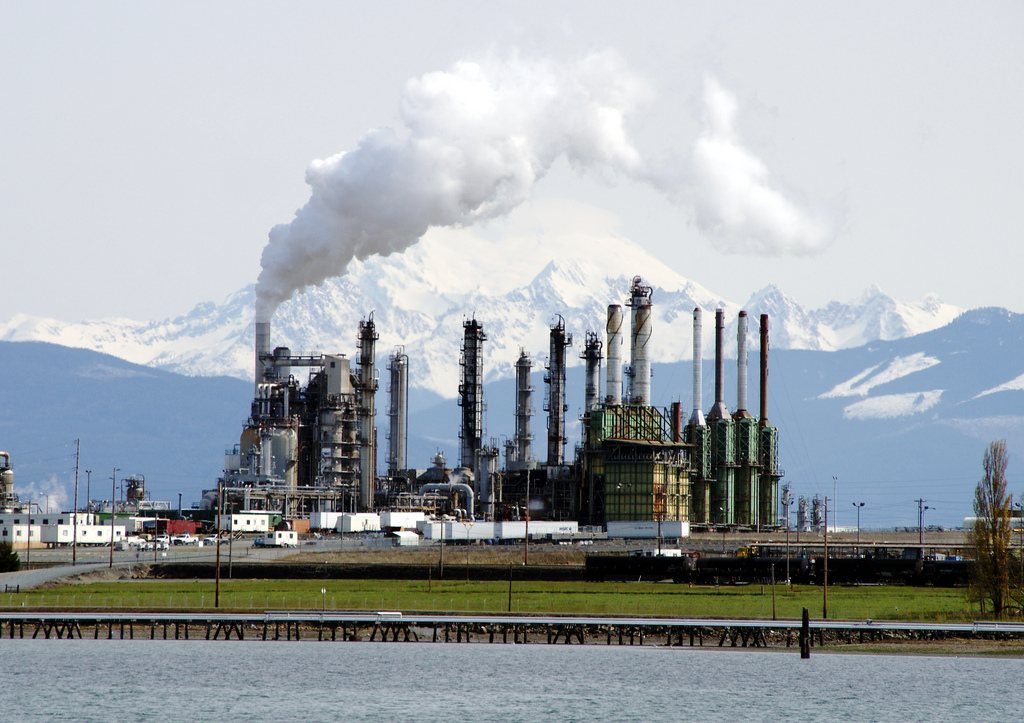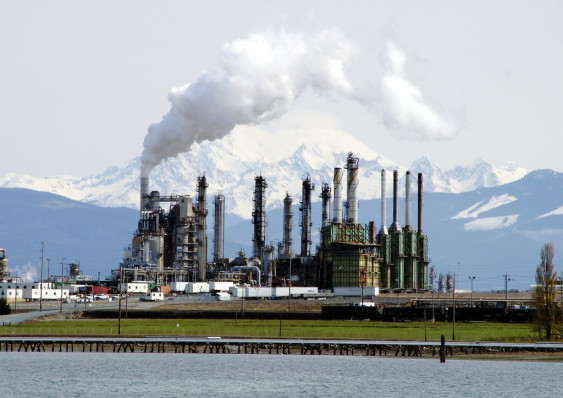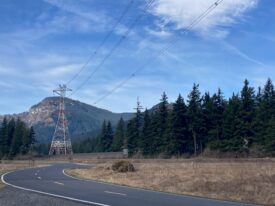As December 2019 closed out the decade, it also brought the close of a years-long battle over a petrochemical project planned for the shores of the Salish Sea when the owner of an oil refinery at Anacortes formally withdrew plans to build a xylene production unit. It was another victory for the Thin Green Line—the Northwest’s opposition movement to fossil fuels.
The victory in Anacortes matters because the xylene project was part of a larger trend in the oil and gas industry to focus on plastics. Facing an array of financial headwinds, many of the biggest fossil fuel companies are now turning to petrochemical production—especially for plastics—as a lifeline. (As one expert on the industry puts it, “you can think of plastic as a kind of subsidy for fracking.”) In the Northwest, the biggest fracking-for-plastics project proposals have been the giant methanol refineries planned for Tacoma and the lower Columbia River. But the xylene project was part of the same story, depending in part on fracked shale oil.
Sightline was among the first to draw attention to the xylene project (here and here), but credit for the victory goes to a half dozen advocacy groups focused on northern Puget Sound—Friends of the San Juans, Stand.earth, RE Sources for Sustainable Communities, Friends of the Earth, Puget Soundkeeper, and Evergreen Islands—who waged a tenacious campaign. The groups argued that the project’s environmental impact statement did not fully address the increased risk of an oil or chemical spill or impacts on the global climate, the Southern Resident Orcas and other wildlife in the region.
It seemed, for a time, that their efforts would be for naught. The project was awarded permits by the Skagit County Hearing Examiner in December 2017, a decision that was upheld on appeal to the Board of County Commissioners in March 2018 and upheld again on appeal to the state Shoreline Hearings Board in September 2018. The advocates challenged the decision in court, however, and in October 2019 the court overturned the Shoreline Hearings Board approval, sending it back it to the Board of County Commissioners for reconsideration. Finally, in December 2019, Marathon reached an agreement with the groups to drop the xylene proposal, while still proceeding with plans for a marine vapor control unit that will improve local air quality.
Marathon did not explain its reasons for withdrawing the xylene proposal. The company may have wanted to avoid continued cost and delay from the legal battle or it may have worried that the Skagit Board of Commissioners would be influenced by increasingly skeptical public opinion and rule in favor of the environmental groups who were raising concerns about petrochemical production on Puget Sound in order to make plastics abroad.
Xylene is liquid petrochemical distilled primarily from partly refined crude oil. It’s a starting point for plastic bottles, polyester fibers, food packaging, paint, rubber, and more. Paraxylene, often abbreviated to p-xylene, is generally considered the most valuable xylene isomer thanks to its role as the principle precursor chemical in the production of polyethylene terephthalate (PET), which is the plastic found in most water bottles and food containers, as well as polyester clothing. Some researchers worry about the potential for PET to leach endocrine disrupters—chemicals that interfere with human hormones.
Halting projects like xylene production at Anacortes is a much-needed complement to the consumer plastics bans that are sweeping North America and, increasingly, Latin America. Even China recently announced a ban on bags and other products. The world is drowning in excess plastic: with 335 million tons produced annually—and 9 million tons ending up in the ocean each year—it is now widely recognized by scientists as a major threat to the climate, wildlife, and ocean health. New research shows that solar radiation degrades plastic, causing it to emit climate-warming methane, while a suite of studies have found plastic fibers almost literally everywhere—in the stomachs of whales, in tap water, and in table salt.
With xylene as with many other failed projects before it, the Northwest can take some pride for charting a different course. A decade of victories for the Thin Green Line make clear that Cascadia systematically rejects fossil fuel expansion in favor of a future that is less harmful and more likely to last.
Zane Gustafson is a contract researcher who earned his MPA with a focus in Climate Policy in 2019 from the Evans School at UW. He also studies foreign affairs, political rhetoric, and American history.











D
Thanks for the update Zane. Unfortunately, the general public needs to become more aware of the entire (BIG) picture of the oil and petrochemical industry. As you correctly stated, the long term business model for crude oil refineries is moving toward basic chemical production as demand for transport and other fuels moves toward alternative electric sources. The leaders and residents of PNW communities need to realize the uniquely valuable environment we live in; one that has not yet been ruined by heavy industries.
The question we collectively should ask ourselves is “why do we choose to live here and why are so many people moving here?”
For those of us who desire high paying jobs in oil & chemical industries as a trade off for living in an increasingly polluted environment I would suggest the states of Texas and Alabama offer booming economies and jobs as their governors solicit dirty industries ignoring pollution laws.
Do we really desire to allow life in our community to go down that path?
Ronald Day
YAYY!!!! PROTECT THOSE THAT CAN’T SPEAK MOTHER EARTH AND ALL HER CREATIONS (ORCA, SALMON, SHELLFISH, EAGLE,ETC..) PROTECT OUR SALISH SEAS💙💙
Stooltsa
Yes we must speak for those who can’t defend themselves. Protect the Salmon, Birds and Trees. All the animals that bring balance to Mother Earth. For our Future Generations. Amen
Stooltsa
AMEN
Vicki
Yes, by all means let’s destroy all of the jobs for local families!